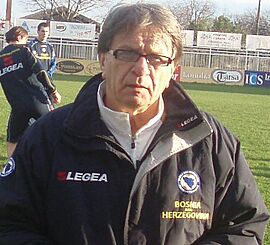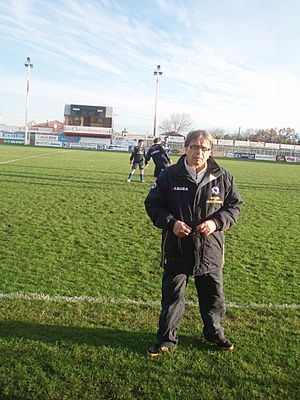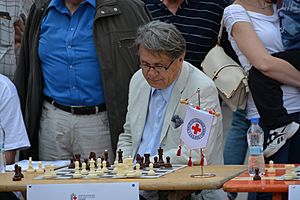Miroslav Blažević facts for kids

Blažević as manager of Bosnia and Herzegovina in 2009
|
||||||||||||||||
| Personal information | ||||||||||||||||
|---|---|---|---|---|---|---|---|---|---|---|---|---|---|---|---|---|
| Date of birth | 9 February 1935 | |||||||||||||||
| Place of birth | Travnik, Yugoslavia (now Bosnia and Herzegovina) |
|||||||||||||||
| Date of death | 8 February 2023 (aged 87) | |||||||||||||||
| Place of death | Zagreb, Croatia | |||||||||||||||
| Position(s) | Right winger | |||||||||||||||
| Youth career | ||||||||||||||||
| Travnik | ||||||||||||||||
| Senior career* | ||||||||||||||||
| Years | Team | Apps | (Gls) | |||||||||||||
| 1954–1955 | Dinamo Zagreb | 0 | (0) | |||||||||||||
| 1955–1957 | Lokomotiva Zagreb | 4 | (0) | |||||||||||||
| 1957–1959 | Sarajevo | 14 | (0) | |||||||||||||
| 1959–1963 | Rijeka | 48 | (4) | |||||||||||||
| 1963–1965 | Sion | |||||||||||||||
| 1965–1966 | Moutier | |||||||||||||||
| Total | 66 | (4) | ||||||||||||||
| Managerial career | ||||||||||||||||
| 1968–1971 | Vevey | |||||||||||||||
| 1971–1976 | Sion | |||||||||||||||
| 1976 | Switzerland | |||||||||||||||
| 1976–1979 | Lausanne-Sport | |||||||||||||||
| 1979–1980 | Rijeka | |||||||||||||||
| 1980–1983 | Dinamo Zagreb | |||||||||||||||
| 1983–1985 | Grasshopper | |||||||||||||||
| 1985 | Prishtina | |||||||||||||||
| 1985–1988 | Dinamo Zagreb | |||||||||||||||
| 1988–1991 | Nantes | |||||||||||||||
| 1991–1992 | PAOK | |||||||||||||||
| 1992–1994 | Croatia Zagreb | |||||||||||||||
| 1994–2000 | Croatia | |||||||||||||||
| 2001 | Iran | |||||||||||||||
| 2002 | Osijek | |||||||||||||||
| 2002–2003 | Dinamo Zagreb | |||||||||||||||
| 2003 | Mura | |||||||||||||||
| 2003–2005 | Varteks | |||||||||||||||
| 2005 | Hajduk Split | |||||||||||||||
| 2005–2006 | Neuchâtel Xamax | |||||||||||||||
| 2006–2008 | Zagreb | |||||||||||||||
| 2008–2009 | Bosnia and Herzegovina | |||||||||||||||
| 2009–2010 | Shanghai Shenhua | |||||||||||||||
| 2010–2011 | China U-23 | |||||||||||||||
| 2011–2012 | Mes Kerman | |||||||||||||||
| 2012–2013 | Zagreb | |||||||||||||||
| 2014 | Sloboda Tuzla | |||||||||||||||
| 2014–2015 | Zadar | |||||||||||||||
|
Medal record
|
||||||||||||||||
| *Club domestic league appearances and goals | ||||||||||||||||
Miroslav "Ćiro" Blažević (born 9 February 1935 – died 8 February 2023) was a famous Bosnian-Croatian football manager and player. He was known for his colorful personality and was often called "trener svih trenera", which means "coach of all coaches" in Croatian.
His playing career lasted from 1954 to 1966. He played for several clubs, including Dinamo Zagreb and Rijeka. After he stopped playing, he became a football manager.
As a manager, his biggest success was with the Croatian national team. He led them to the quarter-finals in the 1996 European Championship. Even more impressively, he guided them to a third-place finish at the 1998 FIFA World Cup. He also managed the national teams of Switzerland, Iran, Bosnia and Herzegovina, and the China Olympic team.
Blažević also managed many clubs, including Vevey, Sion, Dinamo Zagreb, and Grasshopper Zürich. From 1993 to 1995, he was also the president of Dinamo Zagreb.
Contents
- Early Life
- Playing Career
- Managerial Career
- Coaching in Switzerland
- NK Rijeka
- Success with Dinamo Zagreb
- Grasshopper and Prishtina
- Second Time at Dinamo, Nantes, and PAOK
- Leading the Croatian National Team
- Iran and Return to Croatia
- Short Time at Hajduk Split
- Neuchâtel and NK Zagreb
- Bosnia and Herzegovina National Team
- Shanghai Shenhua and China Olympic
- Mes Kerman and Final Club Roles
- Personal Life and Death
- Honours
- Orders
- Film and TV Appearances
- See Also
Early Life
Miroslav Blažević was born on 9 February 1935, in Travnik, which was then part of Yugoslavia and is now in Bosnia and Herzegovina. He was the youngest of eight children in his family. His parents officially registered his birth on February 10th, so that was his official birthday. When he was a teenager, he also trained in skiing.
Playing Career
Blažević started playing football in his hometown for NK Travnik. Later, he moved to Zagreb and joined Dinamo Zagreb. He admitted that his playing career was not extraordinary. Because of this, he started coaching at a young age. He played for clubs like Lokomotiva Zagreb, Rijeka, and Sarajevo. He finished his playing career in Switzerland with Moutier in 1966.
Managerial Career
Coaching in Switzerland
Blažević began his coaching journey in Switzerland, where he had finished his playing days. He first managed FC Vevey from 1968 to 1971. After that, he coached his former team, FC Sion, from 1971 to 1976. He also managed FC Lausanne-Sport from 1976 to 1979. For a short time in 1976, he was the interim coach for the Swiss national team. With Sion, he won the Swiss Cup in 1974, both as a player and as a manager.
NK Rijeka
In 1979, Blažević returned to Yugoslavia to coach Rijeka. In the 1979–80 season, Rijeka finished tenth in the league. However, they had a great run in the 1979–80 European Cup Winners' Cup. They reached the quarter-finals, which was their best European performance ever. They were eventually defeated by Juventus.
Success with Dinamo Zagreb
Blažević became the coach of Dinamo Zagreb on 11 December 1980. Dinamo Zagreb was one of the four biggest clubs in Yugoslavia. After a decent first season, Blažević became a club legend in 1981–82. He led Dinamo to win their first Yugoslav league title in 24 years.
The next year, Dinamo won the Yugoslav Cup. They also fought hard for the league title with Partizan and Hajduk Split. In 1983, Partizan became champions, and Blažević left Dinamo for the first time.
Grasshopper and Prishtina
Blažević went back to Switzerland and won the Swiss Championship with Grasshopper-Club Zurich in 1984. He then returned to Yugoslavia in 1985 to manage Kosovo's KF Prishtina. Under his leadership, Prishtina was promoted to the First Division. He is still remembered as a club legend there.
Second Time at Dinamo, Nantes, and PAOK
In the same year, 1985, he became Dinamo Zagreb's coach for the second time. During this period, he did not achieve any major successes. He left the club again in 1988. His next team was FC Nantes in France, where he stayed until 1990. After Nantes, he spent a season coaching the Greek club PAOK FC.
Leading the Croatian National Team
In the 1990s, as Croatia became an independent country, Blažević became involved with the Croatian Democratic Union (HDZ) political party. He was also close to President Franjo Tuđman. For the third time, he became both the coach and president of Dinamo (then called NK Croatia Zagreb). He won the 1993 Croatian Championship and the 1994 Croatian Cup. He then left the club to focus on managing the Croatian national team.
Blažević started managing the national team part-time in 1994. A year later, it became his full-time job. Croatia was trying to qualify for the European Championship for the first time. Croatia surprisingly won their qualifying group, finishing ahead of Italy. This meant they directly qualified for Euro 96 in England, and Blažević started to become famous worldwide.
At Euro 96, Croatia advanced past the group stage. They beat Turkey and the European champions Denmark. They lost to Portugal. In the quarter-finals, they faced Germany, who won 2–1 and went on to win the tournament.
Even greater success came when Croatia tried to qualify for the 1998 FIFA World Cup in France. They finished second in their qualifying group behind Denmark. They then beat Ukraine in a play-off to secure their spot in the tournament.
Blažević's team for the 1998 World Cup included star players like Zvonimir Boban, Davor Šuker, and Slaven Bilić. In France, they achieved one of the biggest surprises in World Cup history by finishing third. In the group stage, Croatia defeated Japan and Jamaica. They had an unimportant loss to Argentina in their final group game.
In the knockout stages, they beat Romania 1–0 with a penalty kick. This led them to a quarter-final match against Germany. Croatia famously beat Germany 3–0. However, the hosts, France, stopped Croatia in the semi-final, winning 2–1. In the match for third place, Croatia won against the Netherlands 2–1, claiming their first bronze medal.
The rest of his time as Croatian manager was less successful. Croatia did not qualify for Euro 2000. After two draws at the start of the 2002 FIFA World Cup qualifiers, he resigned in late 2000.
Iran and Return to Croatia
Blažević was well-known after the 1998 World Cup. He accepted an offer to lead the Iranian national team during the 2002 World Cup qualifiers. He quickly became popular with Iranian fans. He helped introduce new players to the team. However, Iran lost to Ireland in the play-offs, and Blažević's time in Iran ended. His assistant, Branko Ivanković, took over.
Blažević then returned to Croatia. He first helped NK Osijek avoid relegation. Then, he returned to Dinamo for his fourth time as coach. He won the Croatian Championship in 2003. However, he left again that same year after disagreements with the club's vice president.
Blažević then coached Slovenian club NK Mura for a few months. After that, he became the coach of Croatian side NK Varteks until May 2005.
Short Time at Hajduk Split
In 2005, Blažević made a surprising announcement that he would coach Hajduk Split. He had wanted to coach the club for decades, but some fans were unsure because of his strong connection to Dinamo Zagreb, Hajduk's big rival.
Hajduk Split was quickly eliminated from European competitions under Blažević. They lost 8–0 to Hungarian side Debreceni VSC, with a 5–0 loss in one game. This was one of Hajduk Split's worst losses in Europe. After a series of poor results, Blažević resigned on 18 September 2005.
Neuchâtel and NK Zagreb
In October 2005, he went back to Switzerland to coach Neuchâtel Xamax. He tried to save the club from relegation. Although he achieved some good wins, they finished ninth in the league. They lost in a relegation play-off and were relegated. His time there ended in June 2006.
He returned to Croatia again to coach NK Zagreb. The club had a successful 2006–07 season, finishing third. This earned them a spot in the UEFA Intertoto Cup. However, in the next season, they were eliminated early from the Intertoto Cup. After some key players left, the team had mixed results. Blažević announced his departure from NK Zagreb in May 2008.
Bosnia and Herzegovina National Team

On 10 July 2008, Blažević was named the head coach of the Bosnia and Herzegovina national football team. He quickly became popular with the media and fans in Sarajevo. He was known for his bold statements and promises.
Under Blažević, Bosnia qualified for the 2010 FIFA World Cup play-offs. They played against Portugal but lost both games 1–0. Blažević resigned on 11 December 2009. His departure followed criticism from fans and journalists after he blamed a player for the loss against Portugal.
Shanghai Shenhua and China Olympic
One day after resigning from Bosnia, on 12 December 2009, he signed with Shanghai Shenhua in China. He led them to a third-place finish in the 2010 Chinese Super League, which qualified them for the AFC Champions League.
On 30 November 2010, Blažević was appointed manager of the Chinese Olympic team. He resigned in June 2011 after they failed to qualify for the 2012 Summer Olympics.
Mes Kerman and Final Club Roles
On 28 August 2011, Mes Kerman in Iran announced they would sign Blažević. He returned to Iran after ten years and signed a one-year contract. He started well, but the team later fell into the relegation zone. He was sacked on 14 February 2012 but stayed on as a technical director.
In November 2012, he returned to NK Zagreb to help them avoid relegation. He had some good results, including beating Dinamo Zagreb. However, the team's performance declined. In May 2013, after NK Zagreb was relegated, he announced his retirement from professional football.
In January 2014, Blažević signed with Bosnian club FK Sloboda Tuzla, which was in the second division. He led the club to win their league and get promoted to the top Bosnian league. He won 13 of his 15 matches in charge.
On 2 September 2014, he was named manager of Croatian club NK Zadar. However, he left the club and officially ended his coaching career on 2 January 2015.
Personal Life and Death
Blažević married Zdenka Đorđević in 1962. They had three children and five grandchildren. He was a Bosnian Croat and also held Swiss citizenship.
Miroslav Blažević passed away from prostate cancer in Zagreb on 8 February 2023, just one day before his 88th birthday.
Honours
Player
Lokomotiva Zagreb
- Yugoslav Second League: 1955–56
Sarajevo
- Yugoslav Second League: 1957–58
Sion
- Swiss Cup: 1965
Manager
Vevey
- 1. Liga: 1969–70
Sion
- Swiss Cup: 1974
Dinamo Zagreb
- Yugoslav First League: 1981–82
- Yugoslav Cup: 1982–83
- Prva HNL: 1992–93, 2002–03
- Croatian Cup: 1993–94
- Croatian Super Cup: 2002
Grasshopper
- Swiss Super League: 1983–84
Hajduk Split
- Croatian Super Cup: 2005
Sloboda Tuzla
- First League of FBiH: 2013–14
Croatia
- FIFA World Cup third place: 1998
Individual
- Franjo Bučar State Award for Sport: 1998 (two awards), 2007
- Bosnia and Herzegovina Manager of the Year: 2009
Orders
 Order of Danica Hrvatska with face of Franjo Bučar (1995)
Order of Danica Hrvatska with face of Franjo Bučar (1995) Order of Duke Branimir with Necklace (1998)
Order of Duke Branimir with Necklace (1998)
Film and TV Appearances
Miroslav Blažević also appeared in several films and TV shows, often playing himself.
Film
| Year | Film | Role | Notes |
|---|---|---|---|
| 2004 | Years of the Blazers | Himself | Documentary film about the 1998 World Cup team |
| 2011 | Ćiro | Himself | Documentary film about his life |
| 2012 | Montevideo, God Bless You! | Ante Pandaković | Played a character in this movie |
| 2016 | Vinko & little red riding hood | Himself | Online short film |
Television
| Year | Show | Role | Notes |
|---|---|---|---|
| 1983 | Smogovci | Manager of Dinamo Zagreb | Appeared in one episode |
| 1992–2008 | Nightmare Stage | Himself | Appeared many times |
| 2001 | Svlačionica | Himself | Episode about Robert Prosinečki |
| 2006 | Kazalište u kući | Lonely man | Appeared in one episode |
| 2007–2008 | Ćiroskop | Himself | Host of his own show |
| 2009 | Moja 3 zida | Himself | Appeared in one episode |
| 2009 | IN magazin | Himself | Hidden camera segment |
| 2011-2012 | Studio 45 | Himself | Appeared three times |
| 2015 | N1 Pressing | Himself | Interview |
| 2016 | Ko te šiša | Himself | TV Movie |
| 2017 | Nikad nije kasno | Himself | Appeared in one episode |
Music Videos
| Year | Video | Role | Artists |
|---|---|---|---|
| 1998 | Neka pati koga smeta | Himself | Baruni |
| 2004 | Ako zabijemo gol | Himself | General Woo & Nered |
See Also
 In Spanish: Miroslav Blažević para niños
In Spanish: Miroslav Blažević para niños


